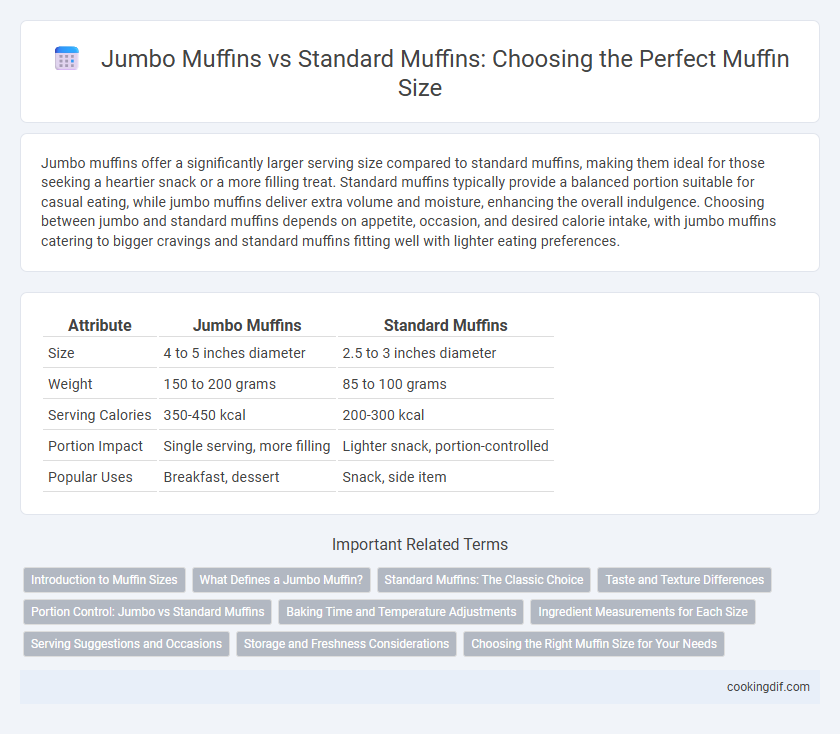Jumbo muffins offer a significantly larger serving size compared to standard muffins, making them ideal for those seeking a heartier snack or a more filling treat. Standard muffins typically provide a balanced portion suitable for casual eating, while jumbo muffins deliver extra volume and moisture, enhancing the overall indulgence. Choosing between jumbo and standard muffins depends on appetite, occasion, and desired calorie intake, with jumbo muffins catering to bigger cravings and standard muffins fitting well with lighter eating preferences.
Table of Comparison
| Attribute | Jumbo Muffins | Standard Muffins |
|---|---|---|
| Size | 4 to 5 inches diameter | 2.5 to 3 inches diameter |
| Weight | 150 to 200 grams | 85 to 100 grams |
| Serving Calories | 350-450 kcal | 200-300 kcal |
| Portion Impact | Single serving, more filling | Lighter snack, portion-controlled |
| Popular Uses | Breakfast, dessert | Snack, side item |
Introduction to Muffin Sizes
Jumbo muffins typically range from 5 to 7 ounces, offering a substantially larger portion compared to standard muffins, which usually weigh around 3 to 4 ounces. The size difference impacts baking time, texture, and ingredient ratios, with jumbo muffins requiring longer baking to ensure even cooking without drying out. Selecting the right muffin size depends on serving needs, calorie considerations, and presentation preferences in both commercial and home baking contexts.
What Defines a Jumbo Muffin?
A jumbo muffin is defined by its significantly larger size, typically weighing between 6 to 8 ounces, compared to the standard muffin's 3 to 4 ounces. Jumbo muffins offer a denser crumb and more substantial volume, making them a popular choice for more filling servings. Their size is often highlighted in bakery menus and nutritional information to distinguish them from regular-sized muffins.
Standard Muffins: The Classic Choice
Standard muffins offer the perfect balance of flavor and portion size, making them the classic choice for everyday enjoyment. Measuring approximately 3 inches in diameter, these muffins provide a satisfying single-serving treat without overwhelming sweetness or calorie content. Their manageable size supports versatility, fitting well in lunchboxes, coffee breaks, and casual snacking occasions.
Taste and Texture Differences
Jumbo muffins typically offer a denser, moister texture compared to standard muffins, which tend to be lighter and fluffier due to their smaller size and faster baking time. The larger volume of jumbo muffins allows for a more pronounced balance of flavors, often enhancing the richness of ingredients like chocolate chips or fruit chunks. Standard muffins usually provide a more uniform crumb and a slightly crispier crust, delivering a different but equally enjoyable taste experience.
Portion Control: Jumbo vs Standard Muffins
Jumbo muffins typically contain 300-400 calories compared to standard muffins, which range from 150-200 calories, making portion control more challenging with larger sizes. Standard muffins provide a more manageable serving that aligns better with calorie-conscious diets and nutritional guidelines. Choosing standard muffins can help regulate portion sizes effectively and support healthier eating habits.
Baking Time and Temperature Adjustments
Jumbo muffins require a longer baking time, typically 5 to 10 minutes more than standard muffins, to ensure they are fully cooked without burning the exterior. The baking temperature for jumbo muffins is often reduced by 25degF (about 15degC) from the standard 350degF (175degC) to allow even heat penetration and prevent over-browning. Adjusting both time and temperature is essential for achieving a moist interior and a browned, tender crust in larger muffin sizes.
Ingredient Measurements for Each Size
Jumbo muffins typically require about twice the amount of ingredients compared to standard muffins, with recipes adjusting flour, sugar, and liquid proportions to maintain proper texture and moisture. Standard muffins use approximately 1/3 cup of batter per muffin, while jumbo muffins can require up to 2/3 cup or more, leading to a direct scaling in ingredient measurements. Accurate scaling ensures consistent baking times and ingredient ratios, preventing undercooked centers or overly dense crumb structures.
Serving Suggestions and Occasions
Jumbo muffins deliver a hearty portion perfect for brunch buffets, breakfast meetings, or as a standalone snack, ensuring satisfaction with just one serving. Standard muffins suit individual portions ideal for casual coffee breaks, school lunches, or dessert accompaniments, offering convenience and variety. Both sizes cater to different occasions, with jumbo muffins enhancing shared gatherings and standard muffins fitting everyday enjoyment.
Storage and Freshness Considerations
Jumbo muffins require more storage space due to their larger size, often needing airtight containers or individual wrapping to maintain freshness. Standard muffins retain moisture more effectively when stored in typical bakery boxes or reusable containers, reducing the risk of drying out. Proper storage conditions for both sizes, such as refrigeration or freezing, can extend freshness but may alter texture, with jumbo muffins being more prone to becoming dense when reheated.
Choosing the Right Muffin Size for Your Needs
Jumbo muffins typically weigh around 6 to 8 ounces, offering a substantial portion ideal for hearty breakfasts or on-the-go snacks, while standard muffins usually range from 3 to 4 ounces, making them perfect for lighter indulgence and portion control. Selecting between jumbo and standard muffins depends on factors such as calorie requirements, meal timing, and appetite, with jumbo muffins providing more energy and satiety. For events or catering, standard muffins allow for serving a larger number of guests, whereas jumbo muffins serve as a more filling individual treat.
Jumbo muffins vs Standard muffins for muffin size Infographic

 cookingdif.com
cookingdif.com